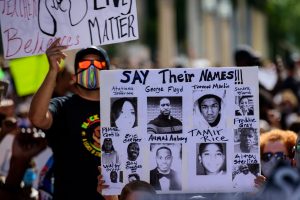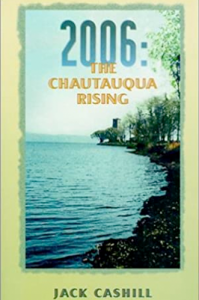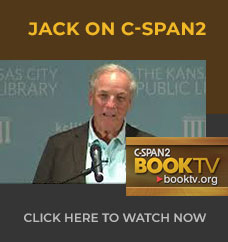COLUMN: Danforth smears Trump, Schmitt with Biden’s discredited ‘Charlottesville hoax’ retread
Upset by the withdrawal from the Missouri Senate race of his handpicked spoiler candidate, John Wood, Danforth published an angry op-ed in the St. Louis Dispatch, complete with a large color photo of the Jan. 6 protest. The 85-year-old Ralston Purina heir charged “radicals” Eric Schmitt, who is the Republican Senate nominee, and former President Trump with spreading the “big lie” about the 2020 election. Danforth took particular offense at Trump’s assertion that “the election was rigged against him.”
angry op-ed in the St. Louis Dispatch, complete with a large color photo of the Jan. 6 protest. The 85-year-old Ralston Purina heir charged “radicals” Eric Schmitt, who is the Republican Senate nominee, and former President Trump with spreading the “big lie” about the 2020 election. Danforth took particular offense at Trump’s assertion that “the election was rigged against him.”
Let us put aside for a moment the issue of voter fraud and focus on the word “rigged.” The rigging, in fact, began with Joe Biden’s entry into the presidential race on April 25, 2019. Biden began his campaign announcement with two words: “Charlottesville, Virginia.” He continued, “[Trump] said there were ‘some very fine people on both sides.’ With those words, the president of the United States assigned a moral equivalence between those spreading hate and those with the courage to stand against it.”
Reiner, Klobuchar and the Big Lie of January 6
 “Is it okay to have a conspiracy to get rid of Trump?” host Bill Maher asked guests Rob Reiner and Sen. Amy Klobuchar on his HBO show on Friday. This exchange got considerable online attention. Most of that attention focused on Reiner’s shockingly ignorant disavowal of the Hunter Biden laptop story.
“Is it okay to have a conspiracy to get rid of Trump?” host Bill Maher asked guests Rob Reiner and Sen. Amy Klobuchar on his HBO show on Friday. This exchange got considerable online attention. Most of that attention focused on Reiner’s shockingly ignorant disavowal of the Hunter Biden laptop story.
Overlooked were the knee-jerk comments by both Reiner and Klobuchar on the subject of January 6. Rather than answer Maher’s question about the suppression of the laptop story, Reiner reflexively retreated to the safe space of January 6. “You know what is not justified,” said Reiner. “Using armed violence to try to kill people in the Capitol.”
Kansas City’s new ‘environmental justice’ law may mean only the rich have air conditioning
In 1936, Kansas City endured 53 days with temperatures 100 degrees or above. The high temperature that summer was 113 degrees. Locals were getting used to the hot weather, as 1934 was the hottest year in American history and Kansas City caught the brunt of it. The high temperature that year was 111. The heat and drought of that era helped spawn the massive dust storms that swept the heartland and pushed all the way through to the East Coast.
degrees. Locals were getting used to the hot weather, as 1934 was the hottest year in American history and Kansas City caught the brunt of it. The high temperature that year was 111. The heat and drought of that era helped spawn the massive dust storms that swept the heartland and pushed all the way through to the East Coast.
Had the city council of Kansas City, Missouri, passed a Climate Protection & Resiliency Plan (CPRP) in 1936, one could understand their motivation. There was a climate crisis. People were dying of heat exhaustion. At the time, almost no one had air conditioning. On the hottest nights, locals slept in city parks by the thousands to find some relief from the heat. For outlying residents of the region, the dust was even harder to escape. Yet, it was not until last week that the city council passed the CPRP. Easily. The vote was 11-1.
Why Isn’t Salman Rushdie’s Attacker a Household Name?
I have been running into people lately. Last week, I had a chance breakfast encounter with “independent” Missouri Senate candidate John Wood, a meeting that I believe led to his withdrawal on Tuesday  from the race. On Wednesday of this week, I had a chance encounter with a fellow from the public defender’s office in Mayville, New York, the county seat of Chautauqua County. I was behind the fellow in the checkout line at the Tops supermarket in Mayville, a town of about 1,500 good souls as quaint and peaceful as Andy’s Mayberry.
from the race. On Wednesday of this week, I had a chance encounter with a fellow from the public defender’s office in Mayville, New York, the county seat of Chautauqua County. I was behind the fellow in the checkout line at the Tops supermarket in Mayville, a town of about 1,500 good souls as quaint and peaceful as Andy’s Mayberry.
The fellow and the checkout clerk were discussing the most notorious resident of the county jail in the jail’s history. I finessed my way into the conversation, working around the fact that, to my embarrassment, I did not know the man’s name. It is Hadi Matar. Two weeks earlier, the 24-year-old Matar stunned the world with his brutal attack on Satanic Verses author Salman Rushdie at the Chautauqua Institution, a historically Christian and painfully liberal summer community about five miles down the road from Mayville.
It’s About Time Liberals Apologize for Their COVID Policies
 In the summer of 2020, as I have done every summer for the past 30 years, I commuted between my home in Kansas City and my cottage on Lake Erie in Chautauqua County, New York.
In the summer of 2020, as I have done every summer for the past 30 years, I commuted between my home in Kansas City and my cottage on Lake Erie in Chautauqua County, New York.
I was reminded of that summer when I came across a photo of a mandatory form that passengers from Missouri had to fill out before landing anywhere in New York state. At the time, Missouri was deemed a COVID “hot spot.” On the bottom of the form I wrote, “Under protest, self-destructive, wasteful, oppressive.” Walking through the Buffalo airport, form in hand, passengers heard a repeated message from Gov. Andrew Cuomo hectoring us about masks and social distancing. Before leaving the secure area of the airport, we all passed through a checkpoint manned by the men and women of the National Guard who were there to collect our forms.
Feeling more rebellious than usual — I had been rebelling since Day One of the lockdown — I chose to run the gauntlet without handing in my card. As I walked past the guardsmen, eyes straight ahead, I imagined myself an East German refugee at Checkpoint Charlie conning his way into the West and waiting to hear someone bark out the last word he would ever hear, “Achtung.” (It helped that at the time I didn’t know what Achtung meant. It just sounded right.) In any case, no one said anything. Score one for the resistance.
Has Wokism Scared Black Students Away from College?
 percent in fact, from 2.5 million students in 2010 to 1.9 million in 2020.
percent in fact, from 2.5 million students in 2010 to 1.9 million in 2020.Prior to that ten-year period, argues Chronicle reporter Oyin Adedoyin, “The story of Black college students in the USA was a narrative of success.” Judging only by numbers, Adedoyin is right. Black population on campus grew nine-fold from 1966 to 2010. The decline since 2010 puzzles administrators given the thousands of DEI officers they have hired and the myriad enticements they have offered to Black students.
Although Adedoyin offers no overarching reason for the enrollment drop, the reader willing to wade through her tortured logic and butchered prose may find an explanation that Adedoyin herself did not seem to notice.
John Danforth’s Shameful Subversion of the Missouri Senate Race

Big Brother is counting.
Sometimes stories just fall into your lap. On Tuesday morning, I was having breakfast with Michael Ryan, a former Kansas City Star reporter who is now executive editor of the Heartlander, a regional online publication. While we waited for our order to arrive in this Kansas City eatery, Mike showed me a deeply researched article he had published about an independent Missouri Senate candidate headlined, “With just an apartment in KC but a multimillion-dollar home in Virginia, does Senate candidate John Wood even live in Missouri?”
As Mike reported, the nominally Republican Wood stepped down from his job as senior investigative counsel for the Jan. 6 committee, rented an apartment in Kansas City, and registered to vote on June 18. Ten days later, Wood announced his candidacy as an independent for the U.S. Senate. In the process, he left behind his family in their five-bedroom, seven-bath, 6,579-square-foot home in McLean, Virginia, a D.C. suburb. Wood had the home built just three years ago.
Global cooling descends on Kansas City
Unlike the rest of the word, here in the Show-Me State we are inclined to ask questions before voluntarily abandoning our cars, surrendering our farms and wrecking our economy. 
Question 1: Is our world really growing warmer? If so, show us the data, the real data, not the computer projections, not the CO2 index, not the tales of heat spells in Sri Lanka or Shangri-La, but the data that matters, the temperatures close to home that we can verify.
Here is what we know. In the past 10 years, Kansas City has not had a day that exceeded 100 degrees. This summer, a warm one, we had three days that reached 100 degrees, but with an average high of 90 in July and 89 in August, 100 is not an aberration.
Have the Cheneys Forgotten the Deep State Hit on Scooter Libby?
 “I have been ashamed to hear members of my party attacking the integrity of the FBI agents involved with the recent Mar-a-Lago search,” the perversely self-righteous Liz Cheney tweeted on Thursday. “These are sickening comments that put the lives of patriotic public servants at risk. Rep. Cheney seems to have forgotten one significant event in her family’s political life: the same weaponized deep state that okayed the raid on Mar-a-Lago convicted her father’s chief-of-staff Lewis “Scooter” Libby on charges that were as manufactured as those leveled against President Trump. If Liz has forgotten, former vice president Dick Cheney surely remembers.
“I have been ashamed to hear members of my party attacking the integrity of the FBI agents involved with the recent Mar-a-Lago search,” the perversely self-righteous Liz Cheney tweeted on Thursday. “These are sickening comments that put the lives of patriotic public servants at risk. Rep. Cheney seems to have forgotten one significant event in her family’s political life: the same weaponized deep state that okayed the raid on Mar-a-Lago convicted her father’s chief-of-staff Lewis “Scooter” Libby on charges that were as manufactured as those leveled against President Trump. If Liz has forgotten, former vice president Dick Cheney surely remembers.The Tragic Irony of the Rushdie Stabbing at Chautauqua
 “Salman Rushdie was stabbed at Chautauqua, flown to Erie, could not get bleeding stopped.” I know the area well. I have a summer home in Chautauqua (pronounced sha-TAWK-wa.) County, the site of my 2000 novel, the then futuristic 2006: The Chautauqua Rising.
“Salman Rushdie was stabbed at Chautauqua, flown to Erie, could not get bleeding stopped.” I know the area well. I have a summer home in Chautauqua (pronounced sha-TAWK-wa.) County, the site of my 2000 novel, the then futuristic 2006: The Chautauqua Rising. A celebrated writer, the 75-year-old Rushdie has been living under a fatwa since February 14, 1989, the day that Iran’s Ayatollah Khomeini decided that Rushdie’s novel, The Satanic Verses, was “blasphemous against Islam.” He was a regular visitor to the Chautauqua Institution. The fact that Rushdie would be stabbed at Chautauqua is perversely and tragically ironic. In the way of background, a Methodist minister founded the institution on Chautauqua Lake in 1874. It served as a campground meeting for summer school teachers and proved popular enough that by century’s end, traveling “chautauquas” were bringing progressive enlightenment to citizens around the nation.
I set the climactic scene of 2006 at the institution itself. The book tells the tale of a grassroots “rising” that anticipated the Tea Party insurgency of 2009-10 and the MAGA movement of more recent years. When I wrote the book I was unaware that a quiet insurrection was brewing on the institution grounds. A group known as Chautauqua Christian Fellowship (CCF) had emerged to correct the Institution’s political and theological leftward drift.

